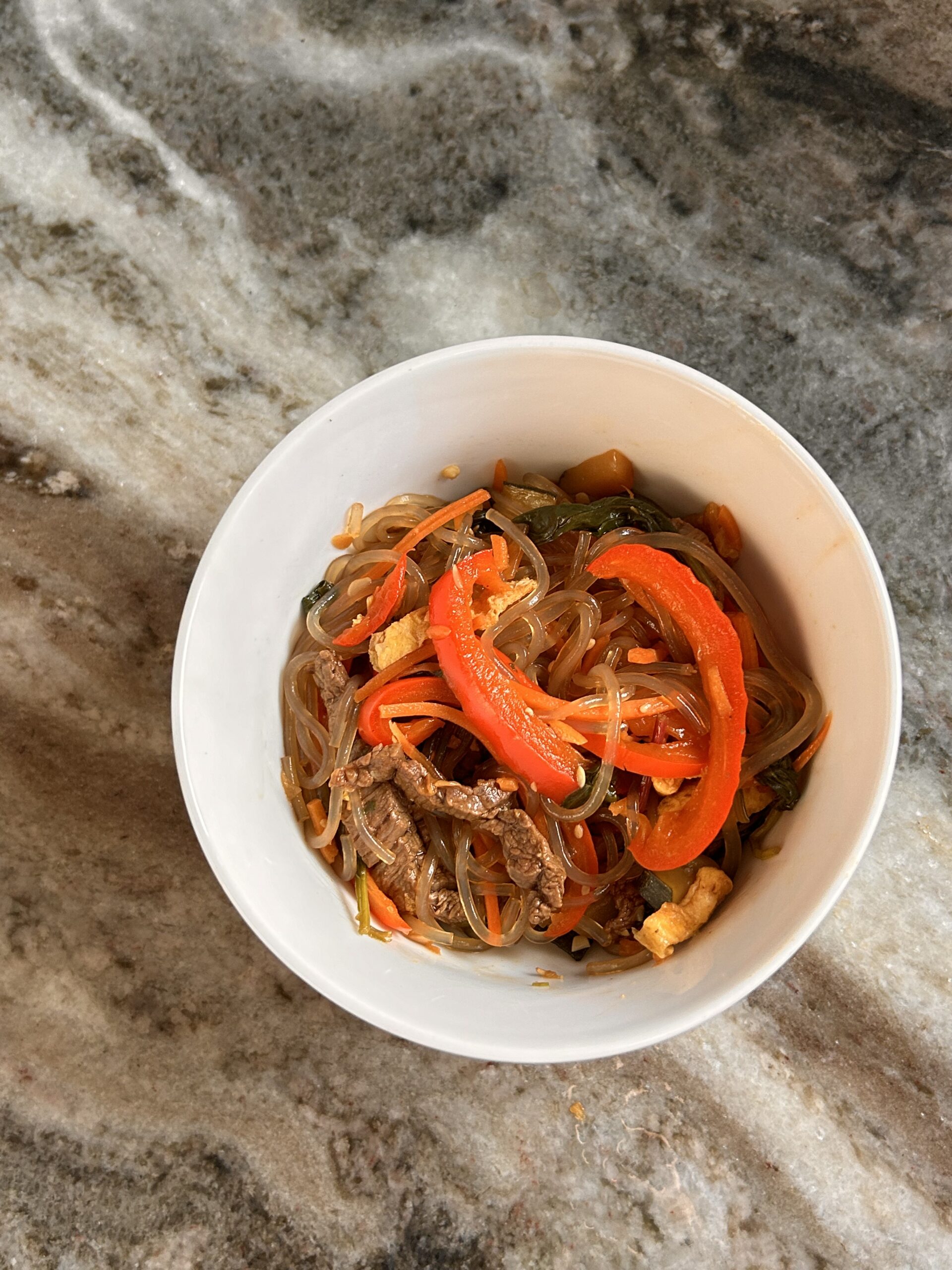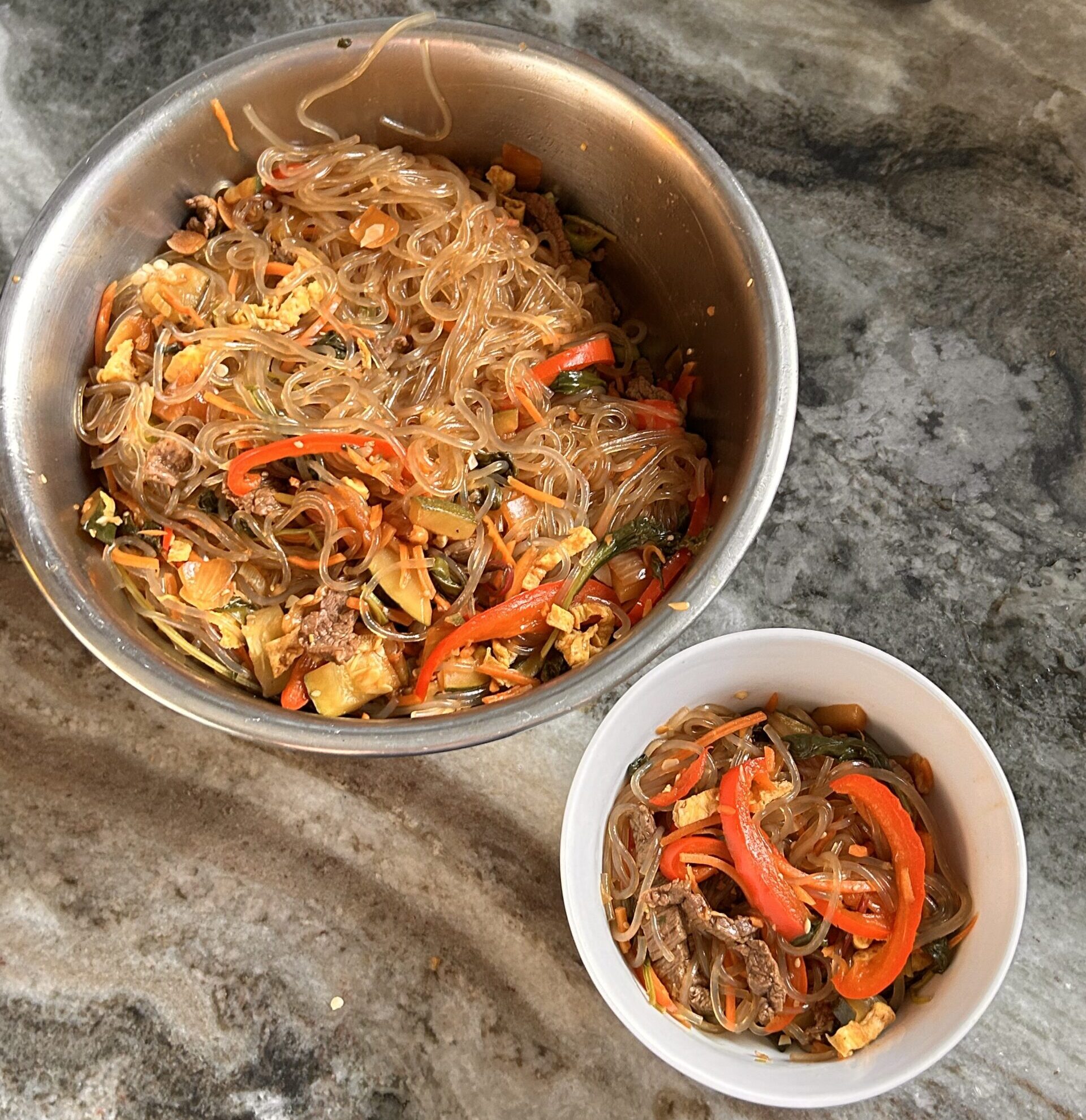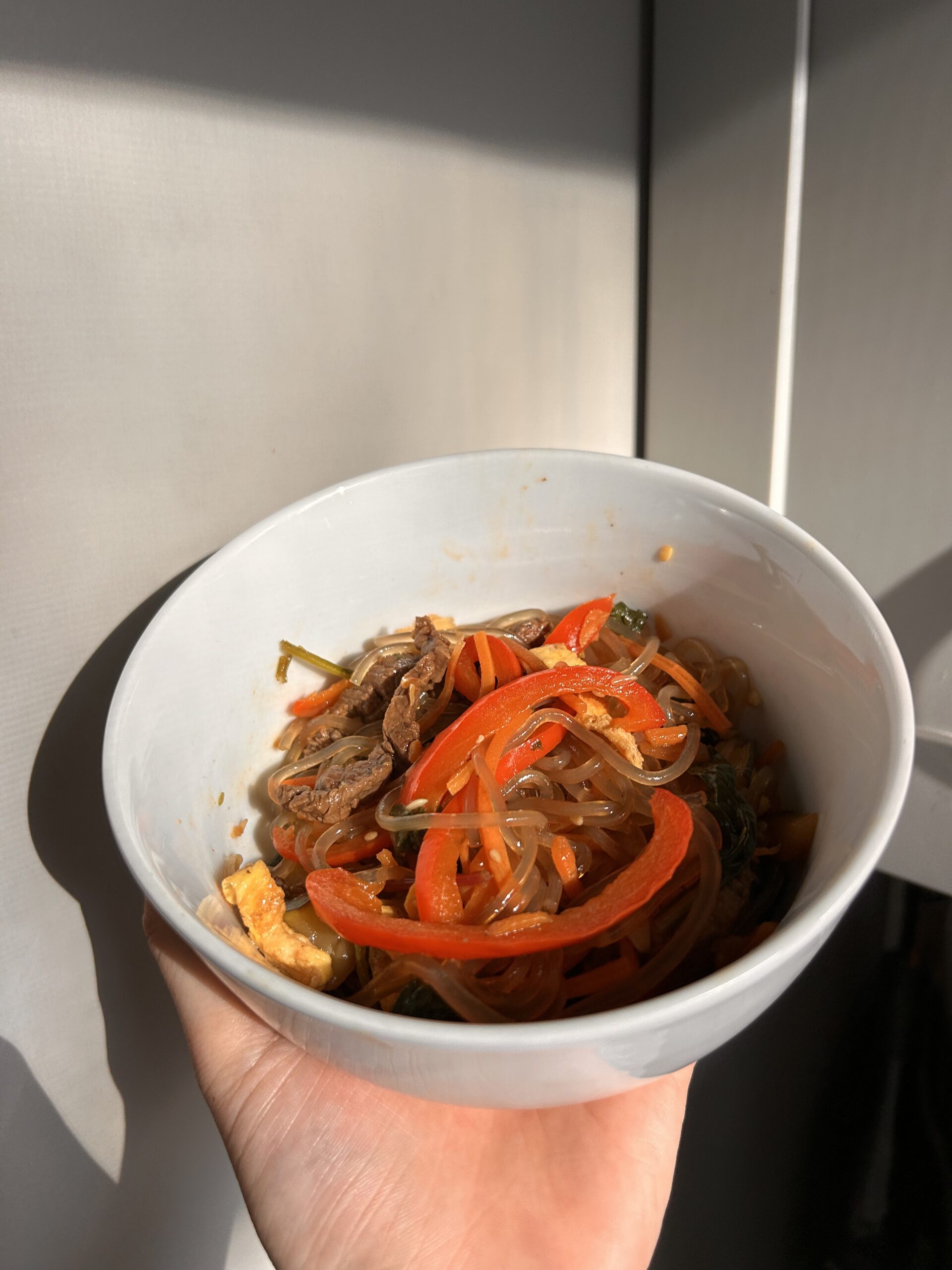Noodles to Meal Prep for the week
This was requested by Stacy Price (@StacyPrice-ms9fm), Thank you for wanting to try out this recipe—I hope it turns out amazing for you!
Japchae has a special place in my heart because I used to work at a Korean restaurant, and this was one of my go-to meals during long shifts. It’s the kind of dish that’s packed with flavor, satisfying but not too heavy, and somehow even better the next day. The chewy sweet potato noodles, crisp veggies, and savory-sweet sesame soy sauce make it the perfect balance of textures and flavors.
Like all my recipes, I’ve tweaked this one to make it easier to prep while keeping the traditional flavors intact. You can choose your protein—beef, chicken, or tofu—and I’m keeping it classic with a thin egg omelet sliced into ribbons. Whether you’re making it for meal prep or just craving a comforting noodle dish, this homemade Japchae always delivers.

Ingredients
Noodles & Sauce
- 200g (7 oz) sweet potato noodles (dangmyeon)
- 3 tbsp soy sauce (adjust to taste)
- 1 tbsp brown sugar or honey
- 1 tbsp sesame oil
- 1/2 tsp black pepper
- 1 tbsp toasted sesame seeds
- 1 tsp vegetable oil (for boiling noodles)
Protein & Marinade (Choose One)
- Beef (100g / 3.5 oz ribeye, sirloin, or short rib, thinly sliced)
- Chicken (100g / 3.5 oz boneless, skinless chicken breast or thigh, thinly sliced)
- Tofu (100g / 3.5 oz firm tofu, cut into thin slices or cubes, pan-fried if preferred)
Marinade:
- 2 tsp soy sauce
- 2 tsp sugar
- 1/2 tsp black pepper
- 1 tsp sesame oil
- 1 clove garlic, minced
Vegetables
- 1/2 medium onion, thinly sliced
- 1 carrot, julienned
- 3 shiitake mushrooms, thinly sliced
- 1/2 red bell pepper, julienned
- 1/2 yellow bell pepper, julienned
- 1 small bunch spinach, washed and stems trimmed
- 2 green onions, cut into 2-inch pieces
- 2 tbsp vegetable oil (for stir-frying)
- 1/2 tsp salt (for seasoning vegetables)
Egg Omelet
- 2 eggs
- 1 tsp vegetable oil
- Pinch of salt

Instructions
1. Prep the Ingredients
Marinate the protein: In a bowl, mix the thinly sliced beef, chicken, or tofu with soy sauce, sugar, black pepper, sesame oil, and garlic. Let it sit while prepping the rest.
Cook the noodles: Bring a large pot of water to a boil, add 1 tsp oil to prevent sticking, and cook the sweet potato noodles according to the package instructions (usually 6-8 minutes). Drain, rinse under cold water, and toss with 1 tbsp sesame oil to prevent sticking. Set aside.
2. Make the Egg Omelet
- In a small bowl, whisk 2 eggs with a pinch of salt.
- Heat 1 tsp oil in a pan over medium-low heat. Pour in the eggs and swirl to coat the pan.
- Cook until just set, about 2-3 minutes, then carefully flip and cook for another 30 seconds to 1 minute.
- Transfer to a plate, let cool slightly, then roll it up and slice into thin strips. Set aside.
3. Cook the Vegetables
- Heat 1/2 tbsp oil in a large pan over medium-high heat. Sauté the onion with a pinch of salt for about 2 minutes until slightly softened. Remove from pan.
- Add another 1/2 tbsp oil, stir-fry the carrots for 1-2 minutes, then remove.
- Repeat with mushrooms, bell peppers, and green onions, cooking each for about 1-2 minutes with a pinch of salt, then set aside.
- Blanch the spinach in boiling water for 10 seconds, then rinse with cold water. Squeeze out excess water and cut into smaller pieces.
4. Cook the Protein
- In the same pan, heat 1/2 tbsp oil over medium-high heat. Add the marinated beef, chicken, or tofu and cook for about 2-3 minutes (or until fully cooked). Remove from heat.
5. Assemble the Japchae
- In a large mixing bowl, combine the cooked noodles, protein, and vegetables.
- Pour in the soy sauce, brown sugar, black pepper, and sesame oil, then toss everything together until well coated.
- Add the sliced egg omelet and gently mix.
- Garnish with toasted sesame seeds and serve warm or at room temperature.
Iski Note
- Vegetarian Japchae: Use tofu or extra mushrooms instead of meat.
- Extra flavor: Drizzle a little gochujang (Korean chili paste) for a spicy kick.
- Make ahead: Japchae tastes even better the next day. Store in the fridge for up to 3 days and reheat in a pan or microwave before serving.


Why this recipe hits
This japchae hits because the chewy noodles soak up all that savory-sweet sesame soy sauce while the veggies stay crisp, not sad and soggy. Plus, the egg omelet ribbons make you feel like you put in extra effort—even if you just flipped it once and hoped for the best.
